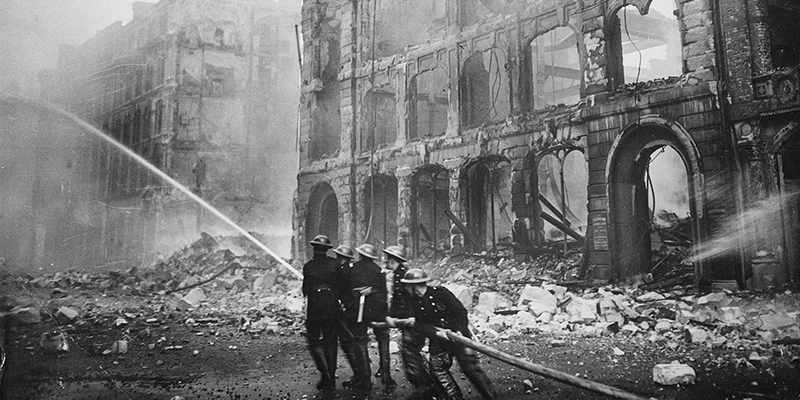
Reading Beyond London’s WWII “Blitz Spirit”
Jo Baker Recommends Jill Paton Walsh, Graham Greene, and More
The Midnight News was begun before the pandemic, but it was mostly written while Britain was in lockdown. Much was said about “Blitz Spirit” at that time: apparently everyone was doing their bit, and we were all in it together, again. But this was just a convenient myth; it wasn’t true of Covid and it wasn’t true of the Blitz.
The idea of the “Blitz Spirit” was always an over-simplification. Of course there was community, self-sacrifice and heroism, but there were also hustlers, crooks and creeps, there were hoarders, dodgers and profiteers. There’s always someone who’ll try to take advantage of even the worst of situations. A wide disparity in safety was also blind-baked into our society; the rich could escape to their country homes, and were already safer in their solid townhouses than working class people, who lived in cheap housing clustered round the major bombing targets of power stations, factories and docks.
Then, as now, we were only “all in it together” in the way that boats are when they’re in a storm at sea: it’s a very different experience in a luxury yacht than in an over-crowded, deflating dinghy. The Midnight News was to capture some of this murkiness, this complexity, this disparity of experience—as regards the Blitz, at least.
When I’m reading, what I want from historical fiction—almost as much as story—is sensory detail, the texture of the time. I want to know the taste of the air, the way clothes feel, what lunch looks like on your plate. At its best, these details come filtered through the experience of sharply individuated characters, who become the lens through which each moment is captured, so that their way of being in the world colors everything. The following books are those that, to my mind, do this. They give the texture of the time, they give us characters whose ways of seeing skews everything in vivid and fascinating ways, and they depict the Blitz, and that whole era, without seeking to simplify or mythologize. They embrace the chaos.
*
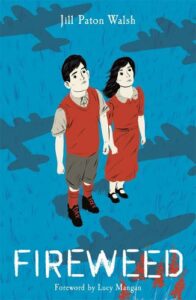
Fireweed, Jill Paton Walsh
“…one plant, willow herb, that some people call fireweed, grows wild in this stony place as plentifully as grass… it has its own rugged sort of loveliness and it grows only on the scars of ruin and flame.”
Ah, this book; I love it so much. It’s the story of two teenagers, Bill and Julie, getting by in the margins of Blitz-battered London, determined to dodge parents and “The Social,” and to live life on their own terms. But as the Blitz intensifies and winter draws on, things become increasingly difficult for them, and, well… spoilers. But it’ll grab you, drag you in, and break your heart. Don’t be put off that it is published as a children’s novel; the prose is exquisite, and the observations of daily life in London under the Blitz are unforgettable.
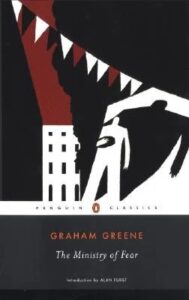
The Ministry of Fear, Graham Greene
There’s something at once seedy and epic about this novel—as one might expect from Graham Greene. Its protagonist is a damaged, morally compromised man, who stumbles into an intrigue and rises to its exigencies; it’s almost Hitchcockian in the ratcheting up of tension and unease (though the film was directed by Fritz Lang.) This is a cratered and carious London, where nothing is as it seems, and no-one can be trusted. The depiction of a bomb-blast—the impact, disorientation and devastation felt on a very immediate, physical level—is brilliant.
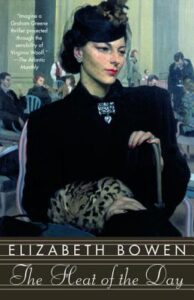
The Heat of The Day, Elizabeth Bowen
The Heat of The Day begins in September 1942, in the aftermath of the Blitz, but the novel is absolutely drenched in the early phase of the war. The sense of fracturedness is palpable. Stella Rodney, the protagonist, lives a precarious, provisional existence as a “camper in rooms of draughty dismantled houses,” bombs still fall on the cratered streets, and there’s the sound of tinkling glass amongst the autumn leaves that tugs characters back instantly into the worst of the bombing. Permeating everything is a sense of sense of un- or surreality; life goes on, but the characters can no longer rely upon the world to behave in a predictable way. Everything has become provisional, even meaning—so that story plays out in a kind moral and emotional twilight.
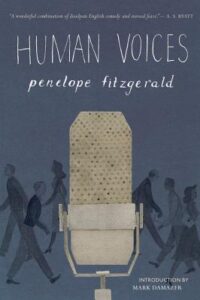
Human Voices, Penelope Fitzgerald
Set at the BBC at the height of the Blitz, this is a brilliant comic novel, that’s also threaded through with darkness, danger and nostalgia. There’s an everyday heroism to its characters’ determination to broadcast the truth, however unwelcome or inconvenient, and to manage as best they can the mayhem that surrounds them. There’s also, for those with an eye for it, some lovely period detail, from the challenges of putting a decent outfit together for a night out, to the local corner café’s substitution of cold baked potatoes for bread rolls. Very filling, it’s observed.
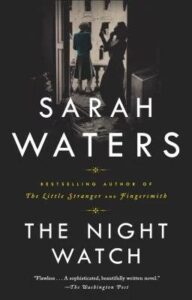
The Night Watch, Sarah Waters
This novel too begins after the Blitz, but moves backward, unpeeling the emotional stasis of its characters to arrive at the beginning, when they’re are brought together by the intensity of the time. I love Sarah Waters for the brio of her storytelling, but she’s also so good at the tiny observations, both physical and psychological. Thinking about small pleasures in the aftermath of such violence, one character observes: Was it a kind of idiocy or selfishness, to want to be able to give yourself over to the trifles… the sun on your face, the prickle of grass beneath your heels, the movement of cloudy beer in your veins, the secret closeness of your lover? Or were those trifles all you had? Oughtn’t you, precisely, to preserve them? To make little crystal drops of them, that you could keep, like charms on a bracelet, to tell against danger when next it came?
__________________________________

The Midnight News by Jo Baker is available from Alfred A. Knopf, a division of Penguin Random House, LLC.
Jo Baker
Jo Baker was born in Lancashire and educated at Oxford University and Queen’s University Belfast. She is the author of the best-selling novel Longbourn, as well as The Body Lies; A Country Road, A Tree; The Undertow; The Telling; The Mermaid’s Child; and Offcomer. She lives in Lancaster, England.



















